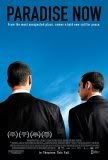
August 7, 2008
Paradise Now (2005)
Should I see it?
No.
No.
Short Review: This film is about a suicide bomber with a heart of gold. He only murders the innocent civilians that REALLY have it coming.

***SPOILER ALERT***
I reveal the end of the film in this review. You’ve been warned.
This is truly a masterful piece of filmmaking. The production is simply amazing. From the writing to the direction to the acting to the lighting, this is a tour de force. That said, it is disgusting.
We follow the journey of Said and Khaled, two Palestinian losers who go from being shiftless mechanics to determined suicide bombers. Kais Nashefis offers one of the most striking cinematic debuts in recent memory as the brooding, troubled, Said. It is fascinating to watch his performance as a man following his faith into oblivion while his desires for Earthly things tug at his heart. His counterpart Ali Suliman provides a rock-solid supporting performance as Khaled, a more personable but equally determined young man. The performances in this film are truly brilliant. Like every other aspect (with the exception of worldview) of this film, the acting is raw and natural - very realistic and believable. You can see these two young men growing up with one another and you can see them getting lost in the theological net of modern day terrorism.
The problem I have with writer/director Hany Abu-Assad’s film is that it appears to be peaceful but it is not. While it does offer what is presumptively the human rights angle of the argument, “Hey, maybe blowing up innocent people on the way to the mall is a bad thing” it doesn’t commit to that ideal. Khaled and Said are sent on a mission to blow themselves up but fail. After some chasing each other around Palestine, the two return to their terrorist bosses. Said is told he cannot go out for another mission and he should return home. Then, in one of the film’s strongest moments, Said opens himself up and explains his desire to kill Israelis. He then falls into a litany of blame and suspicion that permeates the film. The disturbed Said blames Israel for the death of his father even though his own people executed the man. Said wishes to exact his revenge on the innocent people of Israel. He is allowed to do so. In the end of the film Khaled is talked out of igniting his bomb laden body and returns home crying. Said is committed and performs the act. To show Said is a good man, he decides not to get on a bus with a small girl running around in the aisle. He waits for one with just adults. What a guy.
Hany Abu-Assad allows his character to commit a crime against humanity, and showing this without absolute condemnation is inexcusable. Regardless of the masterful way this film was made and regardless of the faint recognition that the actions of Palestinian terrorists are wrong, this film fails to take the moral stand that it flat out wrong to murder innocents. This failure makes this film disgusting.
This film won the Amnesty International Film Prize in 2005. We have real people blowing themselves up and killing real innocent people. If Hany Abu-Assad is incapable of condemning these acts without equivocation he doesn’t deserve a moment’s notice. If Amnesty International is willing to cherish his moral failure they don’t deserve their status. The troubles in Palestine and Israel are deep and harsh. This film does nothing to help in that struggle. This film pretends to support peace, but it supports the opposite. What this film offers in spades however, is a story of oppression and anti-Israeli sentiment.
A final note for Christians. A special slap in the face waits for you in this film. When their terrorist handlers are preparing the two suicide bombers for their murderous work, they are all treated to a final meal. When the group sits down to eat, we are presented with a shot of that replicates da Vinci’s The Last Supper. The two suicide bombers, with bomb belts strapped on, sit in the center framed by their handlers. If you remember the painting, this places the two suicide bombers in place of Jesus Christ in the composition. Nice. Thanks for that.
Overall, this film makes a strong statement, but fails to actually say anything positive. It does give a sense of the Palestinian side of the issue but doesn’t look down on the tactics that side has developed. For that reason I cannot recommend this film. This is a shame because it is very well done.
Related Reviews:
Terrorist movies
Munich (2005)
Right at Your Door (2006)
Other Critic's Reviews:
Celluloid Heroes
Roger Ebert
Labels: film, Hany Abu Assad, Kais Nashefis, movie review, terrorism
Share
Previous Posts




Good News Film Reviews LLC 2004-2010 - used with permission
Images, video and titles are the property of their respective copyright holders. Good News Film Reviews LLC claims no ownership or connection to them.
The views expressed on this site are not the opinion of any advertiser or external entity.
While we take care to only link to responsible entities, Good News Film Reviews LLC takes no responsibility for the content linked from this site. There are sharks in the waters. Surf at your own risk.
The Template is generated via PsycHo and is Licensed.





















2 Comments:
You know, this review really epitimizes what I hate about many christians. They put a blanket ban on anything that might be slightly questionable, simply because they think that it could present bad morals. I myself am a christian, but in my opinion this movie had NOTHING attacking christianity, and hey if you don't like it, don't watch it, but going as far as to call it disgusting is simply too much. Although the film does present an idea that I find wrong, it does so in a way that really is simply trying to give insight to what is going on inside a suicide bombers head. If we don't understand a problem, how are we to help stop it? Also, it seems to me that another purpose of this movie is really one to dispell a common western belief that all Palestinian suicide bombers are simply religious fanatics. They are not condoning the bombings at all, and this is clear through the constant advice of Suha who trys to talk sense into Said before he goes through with his mission. Just because Said ends up bombing Israel does not mean that the producers of the movie are saying that this is what should happen, they are simply reporting on what IS happening. And if you are trying to dispute that it is going on, or are trying to muffle the reports of it stop. It is peoples rights to know what is going on in the world, remember freedom of speech. Another thing that really pisses me off about your review is that you even got some factual information about the movie wrong. In one part you say "The disturbed Said blames Israel for the death of his father even though his own people executed the man." No. Said's father was a collaborator. He was helping the Israeli's. The reason that Said struggles with this is not because he believes that the Israeli's were responsible for his fathers death, but rather because he hates the Israeli's and thinks his father was a traitor for helping them. It is not because of his fathers actions that he is fighting them, but because of his own problems with them. It also appears that he beleives that sacrificing his own life to the cause will balance out his fathers actions because he will be a martyr while his father was a collaborator. Please get your facts straight and stop condemming a movie that is well made and full on a deeper meaning that christians can benefit from and gain a better understanding of the Middle Eastern conflict, of which many are ignorant.
If you'd read other reviews I've written you'll see I'm hardly one of those Christians that puts "a blanket ban on anything that might be slightly questionable". You have to go to some length to disturb me.
The film does condone bombing by its lazy attitude towards condemning it. Yes, Suha tries to advise him but her arguments are moot. It doesn't matter that not all Palestinian bombers are religious fanatics - although the fact they bomb kinda points that way - the film itself sets the bombers up as religious martyrs. This is why they are placed in the Christ role in the replication of the Last Supper image.
The issue of me getting Said's motivations wrong in regards to his father - did I get it wrong? Perhaps, this review was written four years ago and I haven't had the urge to watch the film since. I'm willing to take your word for it. If I did get it wrong, sorry. This said, the overall points still stand.
Structurally, the film does not condemn suicide bombing, it explains it, but it doesn't condemn it. This is no different than explaining the actions and motivations of a child rapist without clearly expressing that the rapist is wrong in their actions. Without the judgment the presentation becomes support for the action.
Post a Comment
<< Home